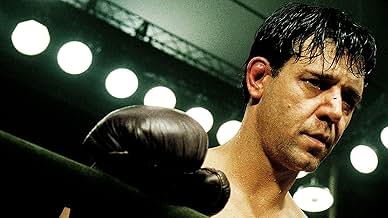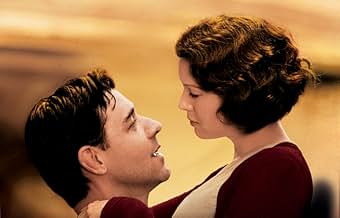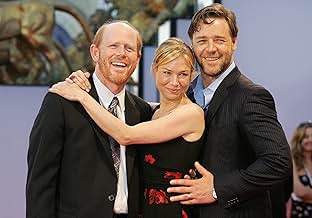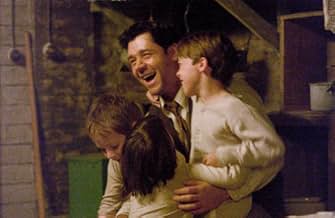The true story of James J. Braddock, a supposedly washed-up boxer, who returned to the spotlight to win the heavyweight championship of the world.The true story of James J. Braddock, a supposedly washed-up boxer, who returned to the spotlight to win the heavyweight championship of the world.The true story of James J. Braddock, a supposedly washed-up boxer, who returned to the spotlight to win the heavyweight championship of the world.
- Nominated for 3 Oscars
- 16 wins & 45 nominations total
Storyline
Did you know
- TriviaRosemarie DeWitt (Sara Wilson) is the granddaughter of the real Jimmy Braddock ("James J."). She is the daughter of his daughter Rosemarie, who was portrayed by Ariel Waller in this movie.
- GoofsThe receipt that Jimmy Braddock gives at the welfare office is about $50 off from the actual amount that Braddock had borrowed. Russell Crowe pointed this out to the director who decided to 'leave it in to prove that it's just a movie'.
- Quotes
Jim Braddock: You think you're telling me something? Like, what, boxing is dangerous, something like that? You don't think working triple shifts and at night on a scaffold isn't just as likely to get a man killed? What about all those guys who died last week living in cardboard shacks to save on rent money just to feed their family, 'cause guys like you have not quite figured out a way yet to make money off of watching that guy die? But in my profession - and it is my profession - I'm a little more fortunate.
- Crazy creditsBefore the title appears the following: "In all the history of the boxing game, you'll find no human interest story to compare with the life narrative of James J. Braddock." - Damon Runyon (1936)
- ConnectionsFeatured in HBO First Look: Cinderella Man (2005)
- SoundtracksShim-Me-Sha-Wabble
Written by Spencer Williams
Performed by Miff Mole and His Molers
Courtesy of Columbia Records
By arrangement with Sony BMG Music Licensing
These films share in common not just a documentary-like approach to boxing or a superficial biopic. They also portray the human side of a modern gladiator and the culture that produced him. In the case of "Cinderella Man," we are given a detailed and heart-rending portrait of the Great Depression in American. The story of the gentleman pugilist James J. Braddock is the backdrop to the larger drama of Americans' struggle in the 1930s.
Russell Crowe provides a brilliant interpretation of Braddock, capturing the decency of a man whose career as a boxer would appear to have peaked at just the wrong time prior to the Crash of 1929. After that momentous event, Braddock's boxing went into decline just like the lives of millions of Americans. The scenes of Braddock and his family living in squalid conditions and with uncertainty about such basics as heat and electricity were carefully developed in the film. Renée Zellweger was outstanding as Mae, the caring but feisty wife of Braddock. Paul Giamatti was also excellent as Braddock's handler-manager, Joe Gould. Joe tries to keep up appearances by sporting fancy clothes. But in one revealing scene in the film when we see the interior of Joe's ostensibly swanky apartment, there is no fancy furniture other than a dowdy table and some flimsy deck chairs. Everyone is reeling from the Depression. In the depiction of the massive unemployment, the "Hoovervilles" of the homeless residing in Central Park, and the desperate need for Americans for an optimistic icon like Braddock to raise their spirits, the film truly captured the tragedy of the Great American Depression.
The film's director Ron Howard emphasized close-ups throughout the film with uneven results. In many of the boxing sequences, the close-ups and rapid editing made it difficult tell the fighters apart. The close-ups continued even into the domestic scenes and the outdoor sequences depicting Braddock working as a longshoreman. The film's dark cinematography conveyed the bleakness of the Depression years, but it worked against bringing out the buoyant spirit of Braddock himself and the optimism that he instilled in others. As a director, Howard's strength is not in film artistry or technique. As apparent in this and other films, his gift lies in narrative storytelling and the development of dramatic character.
Indeed, the characters and the story were the strong points of "Cinderella Man." Much credit should go to Cliff Hollingsworth for a screenplay that included thoughtful dialogue, humor, and multi-dimensional characters. Daniel Orlandi also merits praise for the brilliant costumes that helped to recreate the period of the early 1930s.
But the heart of this film experience is Russell Crowe's screen portrayal of Braddock. It was the colorful sportswriter and raconteur Damon Runyan who coined the nickname of "Cinderella Man" for Braddock. However, the real James J. Braddock was more than lucky. It was his strength of character in and out of the ring that captivated America. One of the most moving scenes of the film was a heated argument between Braddock and his wife Mae where Braddock insists that even in the most difficult of times, he would refuse to be separated from his children. As a boxer, he was fearless. But he demonstrated even more courage in fighting for family valuesa lesson from which we can learn a great deal today in reflecting on this sensitive film.
Details
Box office
- Budget
- $88,000,000 (estimated)
- Gross US & Canada
- $61,649,911
- Opening weekend US & Canada
- $18,320,205
- Jun 5, 2005
- Gross worldwide
- $108,539,911
- Runtime2 hours 24 minutes
- Sound mix
- Aspect ratio
- 2.39 : 1
Contribute to this page







































